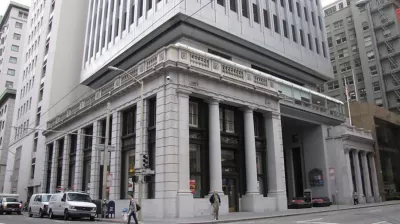Facadism is a critical concept for evaluating projects that rehabilitate, renovate, or redevelop historic structures—but it's often considered too esoteric for conversation. It's time we all got on the same page.

John King tackles a difficult but important concept of central importance for adaptive reuse projects and more: What, exactly, is facadism?
To frame the conversation, King asks the question a different way: "How subjective is facadism?" King answers the question by classifying four categories of facadism, as exemplified by specific buildings (or what's left of them, anyway) in San Francisco:
- The camouflage (a pragmatic "sleight of hand," writes King).
- The scrap (a laudable idea, but maybe not very effective).
- The setback ("the compromise favored by preservationists").
- The top-off (the "strangest act of facadism").
Planetizen readers are invited to share more examples from their cities in the comments below or on Twitter.
FULL STORY: Examples of facadism in SF

Planetizen Federal Action Tracker
A weekly monitor of how Trump’s orders and actions are impacting planners and planning in America.

San Francisco's School District Spent $105M To Build Affordable Housing for Teachers — And That's Just the Beginning
SFUSD joins a growing list of school districts using their land holdings to address housing affordability challenges faced by their own employees.

The Tiny, Adorable $7,000 Car Turning Japan Onto EVs
The single seat Mibot charges from a regular plug as quickly as an iPad, and is about half the price of an average EV.

Trump Approves Futuristic Automated Texas-Mexico Cargo Corridor
The project could remove tens of thousands of commercial trucks from roadways.

Austin's First Single Stair Apartment Building is Officially Underway
Eliminating the requirement for two staircases in multi-story residential buildings lets developers use smaller lots and more flexible designs to create denser housing.

Atlanta Bus System Redesign Will Nearly Triple Access
MARTA's Next Gen Bus Network will retool over 100 bus routes, expand frequent service.
Urban Design for Planners 1: Software Tools
This six-course series explores essential urban design concepts using open source software and equips planners with the tools they need to participate fully in the urban design process.
Planning for Universal Design
Learn the tools for implementing Universal Design in planning regulations.
Smith Gee Studio
City of Charlotte
City of Camden Redevelopment Agency
City of Astoria
Transportation Research & Education Center (TREC) at Portland State University
US High Speed Rail Association
City of Camden Redevelopment Agency
Municipality of Princeton (NJ)



























